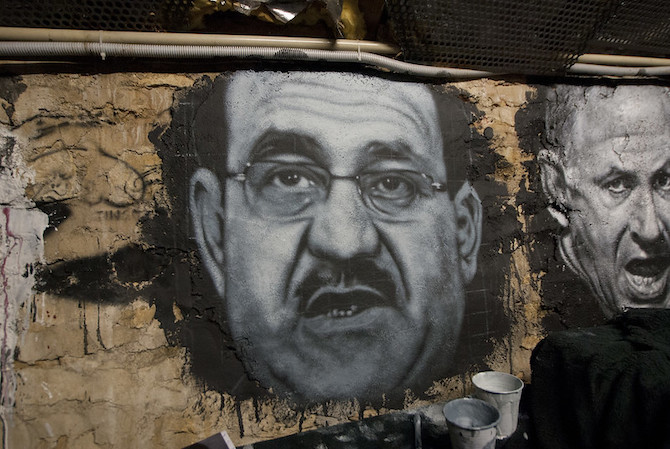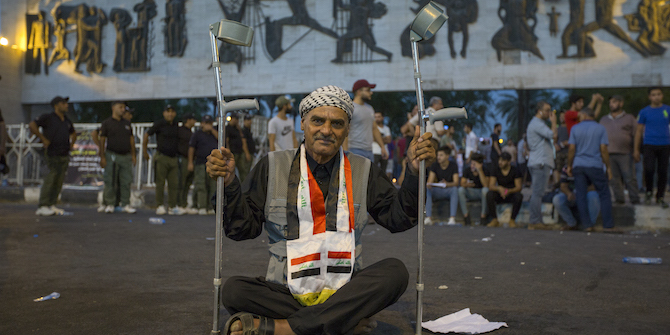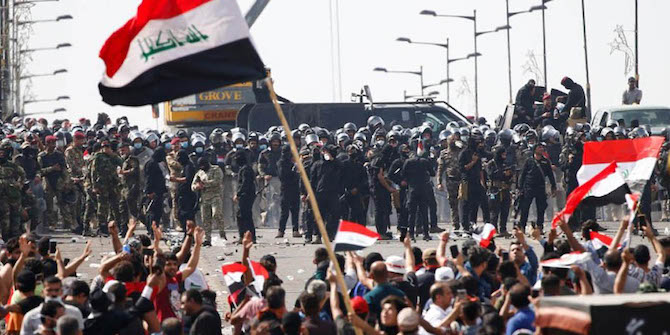by Hayder Al-Khafaji

The repercussions from a leaked audio file attributed to Nouri al-Maliki, the former Iraqi prime minister, have already sparked controversy in the streets of Iraq.
The leaks dealt with sensitive and dangerous political issues that can be summarised in a statement attributed to al-Maliki, in which he said: ‘Iraq is on the verge of a brutal war from which no one will escape unless the joint scheme embarked on by Muqtada al-Sadr; the head of the Kurdistan Democratic Party, Masoud al-Barzani, and the speaker of the Iraqi parliament, Muhammad al-Halbousi, is shut down.’
In response to the leaks, Muqtada al-Sadr published a strongly worded statement on his Twitter account, expressing his bewilderment at ‘the attempt by the Da’wa Party and more particularly their leader, al-Maliki, to kill him.’ Al-Sadr added: ‘I advise al-Maliki to retreat from political life and to beg for forgiveness or to surrender himself and all those who seek refuge with him, to the judicial authorities.’ Al-Sadr further added that: ‘I denounce him for his attack on Iraq’s security forces, for accusing the PMF of cowardice and for inciting them to sedition and in-fighting.’
On 19 July 2022, the Supreme Judicial Council announced that it had opened an investigation into the audio leaks attributed to al-Maliki. Al-Maliki initially denied the authenticity of the leaked audio files attributed to him. He referred to the popular mobilisation forces as being “the cradle of cowards” and to the Shiite leader Muqtada al-Sadr as a “murderer and thief”. However, the wave of criticism against him was so intense that his denials were of no help to him. This was particularly the case after the publisher of the leaks officially introduced himself as journalist and civil activist Ali Fadel, confirming that he had published the audio file so that people would not think that al-Maliki had in any way changed for the better.
Al-Maliki’s lack of judgement in making these statements to someone he apparently did not know is surprising to many Iraqi political observers, who had considered him to be a seasoned politician. Why did al-Maliki act so carelessly and confide in a person who was unknown to him? And why did he express his private views in such a careless manner, only to have them exploited against him in this way? Many believe that the repercussions of the audio leak were as a direct consequence of Maliki’s complacency, especially as he is seen as one of the key players in the Shiite coordination Framework and is thriving to return to power.
It is said that in last week’s meeting of the coordination Framework, the majority of those present at the meeting asked al-Maliki to withdraw his nomination for the post of prime minister. It was also said that he finally acquiesced after comprehensive pressure from the members of the coordination Framework, and told them that he would withdraw from the race for the post of prime minister.
On the other hand, it does not mean that Muqtada al-Sadr, who supposedly retired himself from politics, is ahead of his rivals on the aforementioned coordination Framework. In fact, Muqtada al-Sadr scored a personal goal by pressuring the representatives from his parliamentary faction and forcing them to resign. He predicted that this would lead to a massive social backlash and that a flood of people would take to the streets in support of him, but this never materialised.
The indifference of the masses to this act took Muqtada by surprise, who felt he lost the game he had himself started. Especially since Muhammad al-Halbousi, the parliamentary speaker – who had been one of his main allies, together with Massoud Barzani, until the resignation of the Sadrist movement’s representatives – not only immediately accepted the resignation of the Sadrist parliamentarians, but also held a meeting with their successors and officially announced his readiness to cooperate with them to advance the political process. To add insult to injury, Masoud Barzani also called Muqtada to tell him that he could no longer ally himself with him and that he believed that they should part ways, an event that Al-Sadr could not have foreseen.
Furthermore, the large crowds who attended last week’s Friday prayers – during which al-Sadr himself was not present and his sermon was read out by a close associate – was in fact an attempt to say that he still retained the reins of power and that he had the political weight to galvanise the man on the street. However, he also knew that dominating the masses did not mean that he could overcome the will of his rivals who are now more determined than ever to remove him. This is unless, by some miracle, the political process unfolds in such a way that elections are held again, which at the moment seems extremely remote.
The tug-of-war between Muqtada al-Sadr and Nouri al-Maliki – the main winners of the Shiite political movements in the last Iraqi elections, but on two opposing fronts – can be seen as a struggle between two political losers, both of whom having lost the status quo, but have no intention of retiring from the political scene. Neither of them has a clear policy or a political strategy and both are striving not only to survive, but also to score points against each other and grab as much of power pie as possible.






